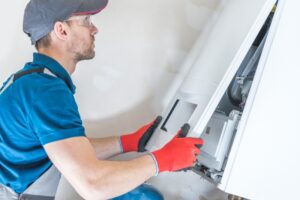We may be coming near the end of the heating season, but still, if you have a gas furnace in your home, then there is never a bad time to talk about furnace safety. Now, we don’t mean to scare you into thinking that gas furnaces are inherently dangerous systems. They are not! However, if they are not properly maintained, they can become potentially dangerous.
We’re going to go through a checklist below that you can use to give yourself and your household peace of mind this year and for the years to come. This isn’t a comprehensive list by any means, and you should always schedule annual maintenance with a trained and qualified professional. However, this can certainly help you achieve safe and efficient furnace use.
Keep the Area Around Your Furnace Clean
This isn’t just a good housekeeping tip, it’s a great safety tip too! Remember, your furnace produces heat through combustion. So, it’s typically a wise idea to keep anything flammable away from your system. Ensure that there are always at least two feet around your furnace that’s kept clear and swept up regularly.
Check/Test Your Carbon Monoxide Detectors
If you do not have carbon monoxide detectors already installed, now is the time to change this. But if you do already have them, that doesn’t mean you’re off the hook. You should be checking them at least as often as you check your smoke detectors (every 6 months is the recommendation) for functionality.
Your furnaces has a component in it called a heat exchanger, and this is where combustion gases collect. If the heat exchanger becomes damaged, it becomes possible for CO to enter your home, and you want to be alerted to this right away, as CO poisoning can be very harmful.
Don’t Ignore Funny Smells
If you sense any strange odors coming from your gas furnace, then you may be detecting a gas leak coming from a damaged gas line. CO is colorless and odorless, but natural gas has a smell reminiscent of rotten eggs that’s added by your utility company to make you aware of when there is a leak.
Also, natural gas is flammable and can be a fire hazard. If you detect this smell, the best thing to do is exit the home and call your utility company’s emergency line or 911.
Replace the Furnace Air Filter
Okay, so this one isn’t so much as a safety tip as it is a functionality tip. There’s a common misconception that the air filters inside HVAC systems are in place to protect indoor air quality. But actually, they’re there to protect the HVAC systems themselves from dust, dirt, and other debris that can get inside and damage components.
Replacing the air filter every 1–3 months (depending on the type of filter and the level of contaminants in your home), ensures that your furnace will operate efficiently, while also safely, without the worry of overheating or increasing fuel consumption due to restricted airflow that can come from a clogged air filter.
AllTech Services, Inc. is your trusted resource for professional furnace service in Manassas, VA. Contact us today!


